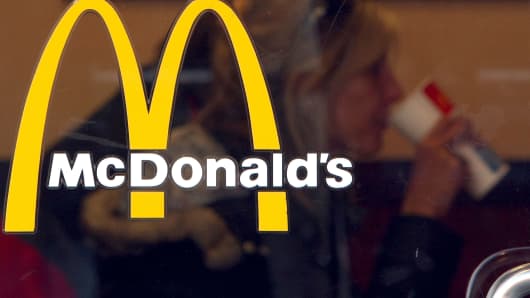McDonald's will give away more than a million breakfast McMuffins across China on Monday, a few days after Chinese state television airs its annual expose on corporate malpractice to mark World Consumer Rights Day.
The promotion, the U.S. fast-food chain says, is purely coincidental. On Friday, news program "3.15" — one of China's most widely watched TV shows — will name and shame companies that it says violated the trust of consumers in a nation forecast to become the world's largest retail market in three years.
The TV show, similar to U.S. CBS network's "60 Minutes," often catches companies off guard, and the fallout can sting as McDonald's itself found out last year when it was criticized on food safety. McDonald's apologized, and its shares fell as China's army of micro bloggers unleashed their anger online.
"The minute there are questions about your practices that appear in any way credible, that can be devastating to consumer trust and extremely difficult to get back," said Shanghai-based James Roy, a senior analyst at China Market Research Group.
(Read More: China Shuts KFC, McDonald's Suppliers in Safety Probe)
While most firms deny their actions are connected to the TV show, "3.15" appears to have prompted a spike in corporate good behavior in China aimed at balancing any negative press.
In addition to the free McDonald's breakfasts, Wal-Mart Stores is running an "adopt a tree" program. Last year, the Beijing Food Safety Administration accused the U.S. retailer of food safety violations, and in 2011, its China CEO stepped down after another food-related scandal.
Hypermarket Carrefour, blasted in last year's TV expose for food safety lapses, has implemented a fruit and vegetable tagging system.
Dealers of Japanese automaker Nissan Motor are hosting lectures on vehicle care and safety, while Chinese furniture firm Ocalone is giving away 100 metric tons of rice, according to local media reports.
"We have been through it once and we know how it feels," said Vivian Zhang, senior director of communications at McDonald's China, in an email to Reuters. Asked if the breakfast promotion was related to Consumer Day, she said: "There is no connection."
Carrefour officials declined to comment for this story and Wal-Mart did not respond to emailed queries.
A separate report by state-run China Central Television in December triggered a food safety scare at fast food chain Yum Brands, dashing sales in its top market.
Who's Next?
Food safety and environmental pollution are chronic problems in China, where just this week official media said around 6,000 pigs were found dead in one of Shanghai's main water sources.
The number of Chinese who said they thought food safety was a major concern has more than tripled between 2008 and 2012, a report by private U.S. think-tank Pew Research Center shows.
(Read More: Beijing to Enact Strict New Food Safety Laws: Xinhua)
Public anxiety over food safety often spreads like wildfire, keeping consumer companies from Coca-Cola to cosmetics firm Avon Products on their toes.
"It's easy to imagine why company brand managers would stay up all night or wake up in a cold sweat," said Karl Gerth, an academic and author of a book on Chinese consumer behavior.
(Read More: Here's One Way to 'Blow Up' the Fast Food Industry)
The Consumer Day expose is also a hot topic for China's half a billion-strong online Weibo community.
The name "3.15" was posted more than 1.5 million times over the last week on Weibo, China's version of Twitter, with many users asking who will be this year's target.
"In 2011, it was Kumho Tire Co. Inc., in 2012 it was McDonald's and Carrefour. Who will '3.15' turn its gaze towards this year?" asked online platform Sohu Business on Weibo.
While companies are keen to pre-empt negative news, they have no guarantee their promotions will convince consumers. "Those companies trying to make themselves look good are just making things worse," said Fang Libing, a financial analyst based in Shanghai. "The more they try to hide, the more they are exposed."


